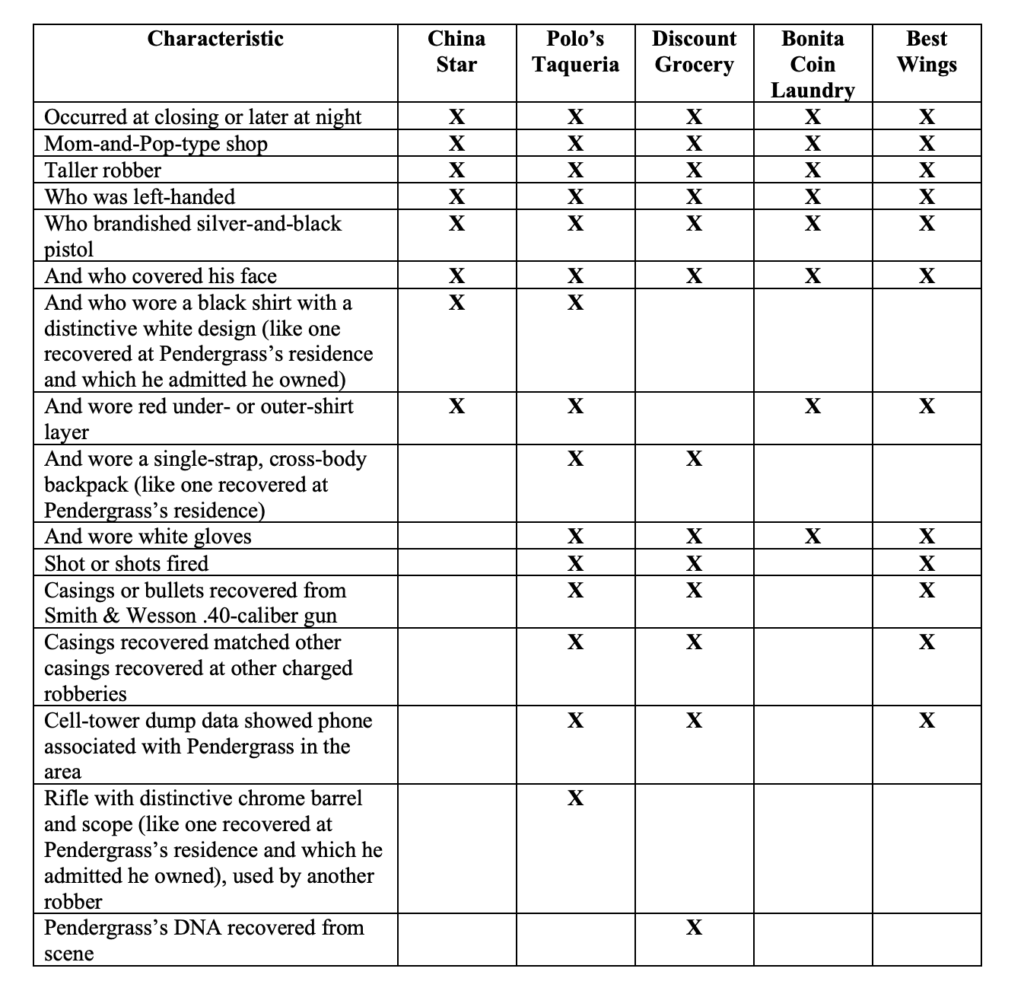Jurors – A probation officer is not a “member of a police department” who is automatically exempt from serving on a jury in a federal criminal trial under 28 USC 1863(b)(6).
Evidence – Evidence of a modus operandi can be sufficient to establish a person’s guilt, and “when modus operandi evidence supports an inference that the same person committed multiple crimes, a jury can consider identity evidence from other robberies.”
Evidence – Out of court statements are not hearsay if they “help explain the later investigative actions,” rather than the truth of the matter, and they do not make it more or less likely that a person committed the crime.
Dontiez Pendergrass was indicted and charged with five counts of armed robbery and carrying a firearm in furtherance of the charged robberies. Pendergrass allegedly robbed five different businesses in the metro Atlanta area. He was convicted by a jury after a trial. He appealed, raising several challenges.
After detailing the evidence from each of the robberies, which included security footage, cell phone tower data, and witness testimony, the Court noted similarities in each each robbery, including one of the robber’s left-handed use of a black-and-white pistol, matching ballistics, and the robber wearing distinctive red and white clothing. There was also cell phone location data and DNA evidence belonging to Pendergrass at some of the robbery locations. Officers later searched Pendergrass’s home and found a backpack matching one on the security footage of the robberies, similar clothes as seen on the footage, and Pendergrass admitted he was left-handed. Finally, during an unrelated incident, officers found Pendergrass after the robberies while responding to a 911 call, and he had been shot and was near his car, which they impounded and later searched with a warrant. The phone they found had incriminating pictures and videos tying Pendergrass to the robberies.
The Court first rejected Pendergrass’s claim that the district court abused its discretion by denying his motion to continue trial, which Pendergrass based on the fact that his appointed lawyer was unprepared because he had only been appointed a few months prior to trial. The Court noted that Pendergrass had not shown how how he could have offered additional evidence or otherwise done things differently at trial had the continuance been granted, and it also noted that the trial court had given Pendergrass additional time to review the discovery.
The Court also rejected Pendergrass’s claim that the district court erred or abused its discretion in declining to dismiss a juror for cause after finding out the juror was a probation officer. Pendergrass had argued that the juror should have been excused under 28 USC 1863(b)(6), which requires “members of police departments” to be exempt from jury duty. The juror was POST certified, a requirement for law enforcement officers in Georgia, she had testified against criminal defendants at trial before, and Pendergrass pointed out other laws associating the Department of Community Supervision with law enforcement. The Court rejected these arguments and held that the”police departments” language in 1863(b)(6) was unambiguously and did not include probation officers. The Court also likened the case to a Tenth Circuit opinion involving a prison guard who was not deemed to be a member of a police department.
The Court also held that, assuming that Pendergrass’s geo-location data should have been excluded as fruit of an unlawful seizure of his cell phone, the error was harmless beyond a reasonable doubt. The Court noted that the geo-location data was only relevant to three of the five robberies, and the other evidence tying Pendergrass to the other two robberies was “crushing,” including the DNA, cell-tower data, the shell casings, and other evidence.
Relatedly, the Court held that there was sufficient evidence to convict Pendergrass on the other three robberies. The Court emphasized the robberies established a “modus operandi and a pattern that support Pendergrass’s convictions for each robbery.” Further, the Court held that “when modus operandi evidence supports an inference that the same person
committed multiple crimes, a jury can consider identity evidence from other robberies.”
The Court included a chart showing the commonalities between all of the robberies–

Finally, the Court held that that the special agent’s testimony was not plain error requiring vacating Pendergrass’s conviction. The Court held that the agent’s testimony regarding the tower-dump records, others’ statements about a potential suspect, others’ statements about the surveillance video, and statements from Pendergrass’s girlfriend and mother regarding his residence were not hearsay because they were not admitted for the truth of the matter, but rather to “help explain the later investigative actions.” Moreover, the Court reasoned, most of the out of court statements here did not make it more likely or less likely that Pendergrass committed the crimes. And while the Court did hold that the statements regarding his residence were hearsay, the Court held that admitting the testimony was not reversible plain error since the information was established through other means. The Court similarly rejected Pendergrass’s confrontation clause challenge to the statements.
Finally, the Court held, assuming error, cumulative error here did not warrant vacating Pendergrass’s conviction.
Appeal from the Northern District of Georgia
Opinion by Rosenbaum, joined by Luck and Anderson
Click here to read the opinion.
